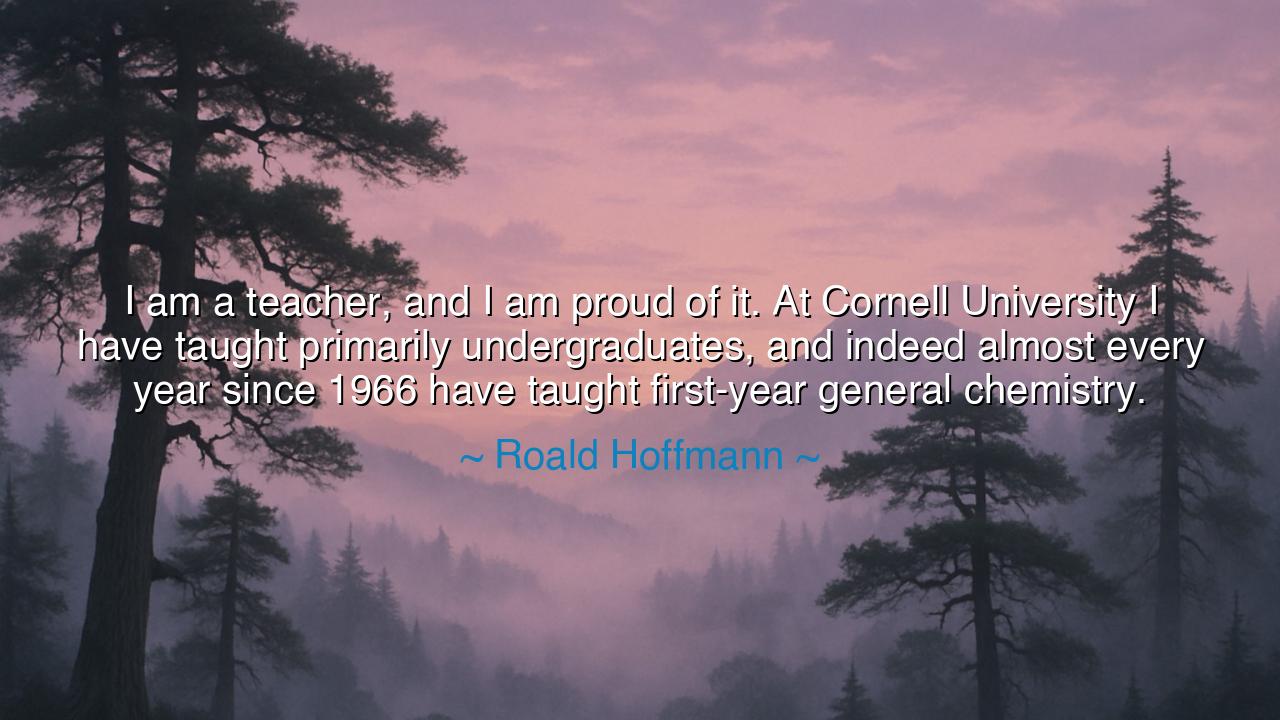
I am a teacher, and I am proud of it. At Cornell University I
I am a teacher, and I am proud of it. At Cornell University I have taught primarily undergraduates, and indeed almost every year since 1966 have taught first-year general chemistry.






Roald Hoffmann once declared: “I am a teacher, and I am proud of it. At Cornell University I have taught primarily undergraduates, and indeed almost every year since 1966 have taught first-year general chemistry.” These words, though humble, shine with a quiet heroism. For in a world that often glorifies titles, discoveries, and fame, Hoffmann—winner of the Nobel Prize—chose to honor the noblest calling: the shaping of minds, the patient work of instruction, the planting of seeds in soil that will grow long after the sower is gone.
Hoffmann’s origin gives these words a deeper weight. A survivor of the Holocaust, he knew the fragility of life and the value of knowledge as a lamp in darkness. His triumph in science could have lifted him high above the classroom, into the rarefied air of prestige. Yet he chose, year after year, to return to the undergraduates, to the beginners, to those who knew little but carried in their youth the promise of the future. His pride was not in standing apart from them, but in walking beside them, guiding them on their first steps into the mystery of chemistry.
The ancients would have praised such devotion. Did not Socrates spend his days among the young men of Athens, stirring their minds with questions rather than retreating into seclusion? Did not Confucius declare that the duty of the master is to teach “without weariness” and to uplift each student, no matter how humble? Hoffmann stands in this lineage: the teacher who does not hoard wisdom as treasure, but scatters it like seed across the fields of youth, trusting that some will take root in time.
History is rich with examples of those whose greatness was multiplied through their students. Consider Aristotle, who taught Alexander of Macedon. The boy became the conqueror of worlds, but his vision was shaped by the lessons of his teacher. Or consider Anne Sullivan, who, by teaching Helen Keller to speak and read, opened the door to a soul the world thought locked in silence. These lives remind us that the impact of a teacher stretches far beyond the walls of the classroom; it reaches into history itself.
Hoffmann’s words also remind us that to be a teacher is not a lesser role than to be a discoverer or creator. Too often society elevates the inventor, the leader, the artist, while forgetting the mentors who first nurtured their gifts. But what is a leader without the one who first taught them letters? What is a scientist without the one who first showed them the patterns of the natural world? The teacher is the root that nourishes the tree of civilization, though the world often sees only the fruit.
The lesson, then, is clear: never despise the calling of teaching, whether formal or informal. If you are entrusted with knowledge, do not hoard it—share it. If you are given the chance to guide another, take it with honor. And if you are a student, never forget the hands that lifted you when you first stumbled through ignorance. Gratitude to one’s teachers is gratitude to life itself.
Practically, this means living with the heart of a teacher. Parents, remember that your daily words shape the future of your children. Friends, recognize that you, too, can teach one another through example and encouragement. Citizens, honor those who dedicate their lives to instruction, for they are builders of foundations unseen. And above all, seek to be both a learner and a guide, for the cycle of wisdom is never complete without both roles.
Thus Hoffmann’s words, simple yet profound, become a call to all generations: to take pride in teaching, to honor those who teach, and to see in the classroom not a lesser stage but the very workshop of destiny. For kingdoms may rise and fall, discoveries may dazzle and fade, but the influence of a teacher endures forever in the lives of those who once sat at their feet.






AAdministratorAdministrator
Welcome, honored guests. Please leave a comment, we will respond soon